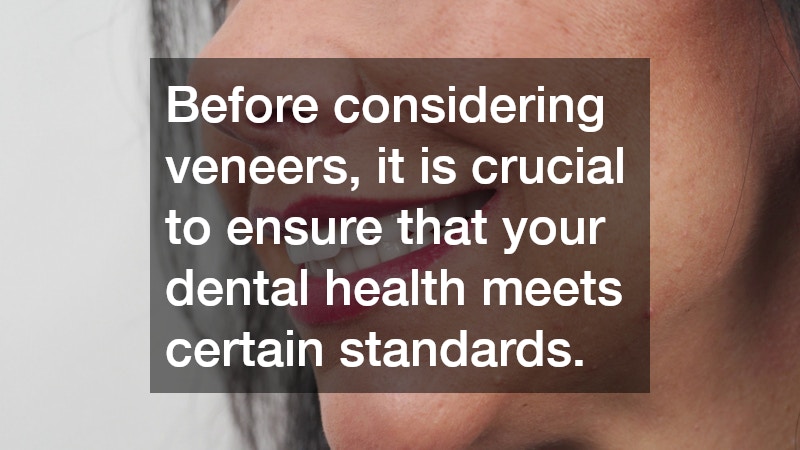
Understanding if you’re a suitable candidate for veneers in Gilbert, AZ is important for making an informed decision about improving your smile. This article outlines the key considerations and questions to assess before deciding on veneers.
Veneers are a popular cosmetic dental treatment used to improve the appearance of teeth by covering them with a thin layer of porcelain or composite resin. Often sought after by those looking to enhance their smile, veneers can effectively address issues like discolored, chipped, or misshapen teeth.
However, not everyone is an ideal candidate for this treatment. Determining whether veneers are right for you involves a thorough evaluation of various factors, including your dental health and lifestyle.
To make the best decision about veneers, it’s essential to consult with a qualified dental professional who can assess your oral health and discuss your aesthetic goals. This article will guide you through the primary dental health requirements for veneers, how lifestyle factors can influence candidacy, and how existing dental issues may affect your suitability for veneers. By the end, you’ll have a clearer understanding of whether veneers are the right choice for you and what steps to take next.
What are the primary dental health requirements for veneers?
Before considering veneers, it is crucial to ensure that your dental health meets certain standards necessary for the procedure. One of the primary requirements is having healthy tooth enamel, as veneers rely on proper adhesion to your teeth. If your enamel is too thin or compromised, achieving a strong bond with the veneer may be challenging, potentially leading to issues like veneer failure or tooth damage. Therefore, a thorough dental examination to evaluate enamel integrity is essential.
In addition to healthy enamel, candidates for veneers should have strong overall oral health. This means that any existing oral health issues—such as gum disease, cavities, or infections—must be addressed before proceeding with veneers. Untreated dental problems can compromise the success of veneers and even exacerbate existing conditions. Maintaining good oral hygiene and receiving regular dental check-ups are vital steps to ensure your mouth is in optimal condition before considering veneers.
Another key consideration is the alignment and bite of your teeth. Veneers can help correct minor alignment issues, but they are not suitable for significant orthodontic problems. If your teeth are severely misaligned or your bite is significantly off, orthodontic treatment might be more appropriate before opting for veneers. Fixing these issues will help ensure the longevity and success of your veneers, as well as improve overall oral health and function.
How does lifestyle affect veneer candidacy?
Lifestyle choices can significantly impact your suitability for veneers. For instance, if you habitually grind or clench your teeth, also known as bruxism, you may not be an ideal candidate for veneers. Continuous pressure on the teeth can cause veneers to crack or dislodge prematurely. Wearing a night guard or addressing bruxism can mitigate these risks, but a comprehensive assessment with your dentist is crucial for determining a viable approach.
Your diet is another lifestyle factor that can influence the success of veneers. Consuming a diet high in sugary foods and drinks may contribute to tooth decay, which can jeopardize the longevity of veneers. Additionally, habits like chewing on hard objects, such as ice or pens, can cause damage to veneers over time. Being mindful of these habits and maintaining a balanced diet can enhance the durability of your veneers and support overall oral health.
Lastly, your commitment to oral hygiene plays a pivotal role in veneer candidacy. Veneers require routine care, similar to natural teeth. Regular brushing, flossing, and dental visits are essential to prevent decay around the veneers and to maintain their appearance. If you’re not diligent about oral hygiene, you run the risk of developing issues that could compromise your veneers. Demonstrating a consistent and thorough oral care routine can make you a more suitable candidate for this cosmetic enhancement.
Can existing dental issues affect your suitability for veneers?
Existing dental problems can play a significant role in determining your preparedness for veneers. For instance, untreated cavities or tooth decay must be resolved prior to veneer placement, as these issues can impact the adherence and effectiveness of veneers. Addressing such concerns not only improves your candidacy but also ensures your mouths’ overall health and readiness for cosmetic procedures.
Gum health is another critical factor to consider. Healthy gums provide a solid foundation for veneers. If you are experiencing gum disease, such as gingivitis or periodontitis, these must be treated before veneer placement. Compromised gum health can lead to veneer failure, as well as exacerbate oral health problems. A focus on achieving optimal gum health can improve your suitability for veneers and enhance the long-term success of the treatment.
Structural issues with your teeth, such as significant chips, fractures, or previous dental work, can also influence your veneer candidacy. In some cases, damaged teeth may need additional work, such as crowns, instead of veneers. It’s essential to evaluate these conditions with your dentist to determine the best treatment solution, ensuring you achieve the desired outcome while maintaining oral health.
Conclusion
Summarize the key indicators of veneer candidacy, emphasizing the importance of consulting with a dental professional to evaluate individual cases and ensure the best outcomes.
In summary, being a good candidate for veneers involves meeting several dental health requirements, evaluating how lifestyle choices impact your oral health, and addressing any existing dental issues. Healthy tooth enamel, sound overall dental health, and minor alignment problems are some of the primary factors influencing veneer candidacy. Lifestyle habits such as grinding teeth or poor oral hygiene can negatively affect veneer success, so they must be carefully considered.
Consulting with a qualified dental professional is crucial in assessing your suitability for veneers. They will help identify any underlying dental problems and suggest the best approach to achieving the desired aesthetic results. Understanding your unique needs and maintaining consistent oral care can lead to a successful veneer experience, enhancing your smile and boosting your confidence.

